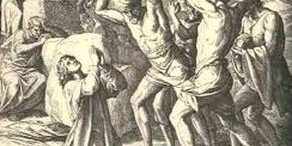
The Acts of the Apostles
By Fred Zaspel
What is the book of Acts all about? What is its significance? Today I want to draw our attention to this important book, highlighting its role and function in the New Testament canon and locating its history in God’s redemptive purpose.
Its Place and Role in the Canon
The Promise of deliverance from sin by the Divine Deliverer had long been left standing. Repeated over and over again throughout the centuries of the Old Testament the hope was kept alive. Then finally He came. The Gospels record the good news for us — Jesus Christ, the Lord from heaven, had come as the long-promised the savior of sinners and had by himself finished the work of salvation. He had offered himself in sacrifice in place of sinful men, and he had now risen from the dead in triumph over Satan. He had ascended as universal Lord, calls on all men everywhere to repent, and will one day return as judge. Now this urgent message of grace and warning must get out to the world (see Matt.28:16-20).
This good news — the gospel, the message of the person and work of Jesus Christ — must be preached in all the world, as Jesus himself commanded. And this is the significance of the book of Acts. It is the record of the first presentation and spread of the gospel, to the Jews first and then to the world.
Its Purpose
Luke’s purpose seems very obvious: to provide an orderly and certain account of the beginnings of Christianity. His first volume (the Gospel of Luke) lays the foundations — the life, ministry, death, resurrection, and ascension of Jesus. This second volume picks up where the first left off and traces the continued work of Jesus by the Holy Spirit and through the apostles to the entire world. As such this is the first written history of the early church, the earliest account of the spread of Christianity, written by a companion of the apostle Paul himself.
Its Title
Since the second century “The Acts of the Apostles” has been the title by which this book is known. It is an appropriate title in that the book traces the work of the apostles in the spread of Christianity through the world. The word “Acts” places the books within a specific genre of literature which gives accounts of the great deeds of famous people or nations. Luke would probably not have objected to this title (“The Acts of the Apostles”) but, given his own emphasis, may well have preferred “The Acts of the Holy Spirit” or, perhaps better still, “The Acts of Jesus, the Ascended Lord” (see Acts 1:1) — it is in Luke’s mind, after all, a record of what the Lord Jesus Christ went on to accomplish in the world through his apostles in the three (or so) decades following his ascension.
Overview & Major Divisions
Acts 1:8 provides a nice outline of the book — the spread of the gospel from Jerusalem to the ends of the earth. In Acts 1-12 it is primarily the apostle Peter whom we see leading the Christian witness both to the Jews and to the first Gentile Christians. In Acts 13-28 it is primarily the apostle Paul by whom the gospel is taken outside of Jerusalem and Judea to the pagan world.
Notice the similar summary statements provided at strategic points throughout the book (Acts 6:7; 9:31; 12:24; 16:5; 19:20) and Luke’s notices of its growing impact (Acts 2:41, 47; 5:14; 6:7; 9:31; 12:24; 13:48; 16:5; 19:20; 17:6; 28:31, etc.).
Summary
The book of Acts records the spread of the Gospel out from Jerusalem to the world and functions as the historical bridge from the Gospels to the Epistles, providing the setting and background of the letters of the apostles and of the churches who received them. Yet in Acts, much like in the Apocalypse (as Warfield once commented) the curtain is lifted, as it were, and we are made to see the advance of the gospel from the standpoint of heaven. This is, after all, the divine mission of world salvation being carried out, and it is by the power of the Spirit of God, now descended, that “the Word of God grows and is multiplied” and his people are given success.
Fred Zaspel holds a Ph.D. in historical theology from the Free University of Amsterdam. He is currently a pastor at the Reformed Baptist Church of Franconia, PA. He is also an Adjunct Professor of Systematic Theology at Calvary Baptist Seminary in Lansdale, PA. He is also the author of The Continuing Relevance of Divine Law (1991); The Theology of Fulfillment (1994); Jews, Gentiles, & the Goal of Redemptive History (1996); New Covenant Theology with Tom Wells (New Covenant Media); The Theology of B.B. Warfield: A Systematic Summary (Crossway, 2010). Fred is married to Kimberly and they have two children, Gina and Jim.

